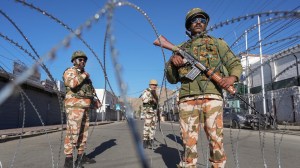Murdered RTI activist had taken on Gir mining mafia
On July 21,barely a fortnight after he filed a PIL in the Gujarat High Court seeking an end to illegal limestone mining along the Gir wildlife sanctuary...
On July 21,barely a fortnight after he filed a PIL in the Gujarat High Court seeking an end to illegal limestone mining along the Gir wildlife sanctuary,36-year-old activist Amit Jethava was killed. He was shot from point blank range on a busy highway in Ahmedabad,minutes after he came out of his lawyers office near the very court where he filed PILs year after year.
Gujarat has the countrys fourth largest limestone deposits,some 12,000 million metric tonnes spread over Kutch,Junagadh,Amreli,Banaskantha and Sabarkantha. Official estimates peg the states current mining market to be worth well over Rs 500 crore a year but unofficial projections say it is much more.
A complex nexus of politicians,influential businessmen,bureaucrats and goons controls the illegal slice of the mining business,overshadowing its legally allowed chunk. Some of Jethavas efforts using the RTI Act and PILs had changed things and sent politicians,the government and its babus scampering for cover.
Hours after his motorcycle-borne assassins left him bleeding to death by the roadside,fingers were being pointed at Dinesh Solanki,BJPs powerful MP in Junagadh. Solanki,who is close to former Home Minister Amit Shah and Finance Minister Vajubhai Vala,holds considerable sway over the local mining business.
But Solanki has not been seen after Jethavas killing,not even by the police personnel guarding him. Junagadhs SP Maninder Pawar admitted he had no idea where Solanki was.
The MP,however,put out an advertisement in local newspapers on Monday,proclaiming his innocence,even suggesting that someone else hit by one of Jethavas many PILs may have got him killed. Solankis advertisement also maintained that Jethavas latest PIL could not have impacted mines working in my name since those shut down after a Supreme Court order.
Jethava was not known to get fazed by circumstances. Operating mostly from his village Khambha,he soon managed to become a member of the state wildlife advisory board,even logged his name in the state as well as national environment protection circuit.
From his one-room office in Khambha,he used the RTI Act to source information from all over,and then followed it up in courts with his many PILs. It was one of his PILs that forced the state government to agree in court to appoint a Lokayukta and RTI information officers.
His pursuit of almost every development in the Gir wildlife sanctuary areas often kept the state forest brass on the tenterhooks,before he shifted base to Ahmedabad a couple of years ago to begin focussing more on the RTI route.
Senior forest officials recall the first line of a government circular some five years ago,stating: Amit Jethava na akshepo upar dhyan levo nahi (Do not take any complaints from Jethava seriously).
It is not usual for a state government to issue an official circular asking not to take an individuals complaints seriously,ordering officers to use their discretion, an official said.
His father Bhikhabhai runs a cobblers shop in his village. My boy had courage. He never thought twice before getting to battle Solanki. He ignored the many threats that he kept getting from Solanki, he alleged.
Jethavas latest PIL related to a mining lease that Solanki reportedly got sanctioned by the Junagadh collectorate in Pichvi village,which,according to forest department records,is one of the six villages in Kodinar that falls within the prohibited five-kilometre radius surrounding the ecologically sensitive Gir sanctuary.
The lease (survey numbers 131 and 131/1) was extended for another 10 years in 2006. In 2007,state officials,under pressure from Jethava,cancelled Solankis lease along with 34 other illegal leases in the Kodinar-Jamvada belt.
But Jethava,in his PIL,claimed that the cancellation was only on paper. He adduced government records,including evidence of an alleged illegal mining racket unearthed by the state geology and mines department official,Y B Raval,on January 24 to point to Solankis role.
The MP had obtained the electricity connection to the mining sites in his nephews name. Jethava produced copies of the electricity bills to contend that illegal mining was still going on. On July 9,the High Court issued notices to all the respondents,and posted the hearing for August.
Forest officials and political circles in Junagadh and Amreli recall how close Jethava and Solanki once were. When Jethava began his wildlife activism,Solanki (who was then an MLA) allowed him to use his MLA quarters in Gandhinagar during his visits, said a forest officer.
But all that changed in 2007,when Jethava contested the Assembly polls against Solanki.
Incidentally,it was Solanki who urged Jethava to cash in on his increasing popularity and contest the elections for the Khambha-Kodinar Assembly seat. Solanki wanted Jethava to cut into the vote share of Dhirsinh Barad,who was touted to be the Congress candidate and who wielded significant clout in Khambha.
But the Congress fielded Laxman Parmar instead of Barad. Solanki then asked Jethava to withdraw his nomination. But Jethava refused,deciding to remain in the fray. Solanki won the seat for the fourth time. When he vacated the seat to become MP in the 2009 Lok Sabha polls,Barad won the Kodinar seat. Jethava got close to Barad,as they then had a common foe in Solanki.
Over the last couple of years,Jethava often took on Solanki. The Rajmoti Charitable Trust run by the MP had to give up possession of its newly-built community hall after Jethava filed a petition in court pointing out that it was built using Central and state government grants and was,therefore,public property.
Jethava then used the RTI route to prove that all the cellphone towers installed in Kodinar,in which Solankis nephew,Pratap Solanki,had a business interest,were illegal. He also tried to prove that although a criminal case of rioting and assault was pending against Solanki (who was accused of assaulting Barad and his kin),the MP was being allowed to go to the US.







- 01
- 02
- 03
- 04
- 05
























